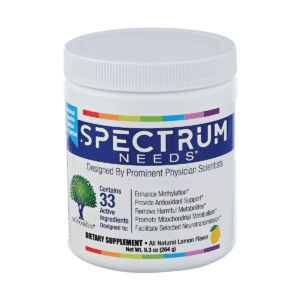$84
INOSITOL (ALSO KNOWN AS MYO-INOSITOL)
The nutrient inositol, also known as myo-inositol, was once called “vitamin B8”, however, it was later found to be produced by humans, and thus is not a true vitamin. Inositol heightens the activity of serotonin in the brain, and thus has a vital role in mood and emotional balance. In addition, inositol is also a component of the lipid phosphatidylinositol, helps with fat metabolism, and complexed with phosphates serve as important secondary messengers in cells. Inositol is sometimes recommended in a wide variety of neurological and mental conditions, including autism, although this is not well studied. Side effects are rare at usual doses used in supplementation.
 Inositol in Spectrum Needs
Inositol in Spectrum Needs
Inositol is added in order to provide a wide basis of nutrition, and based on its role in serotonin metabolism and potential efficacy in a variety of mental conditions. Side effects are unexpected.
Myo-inositol is the biologically active form of inositol and is the form present in dietary supplements, usually simply under the name of “inositol”. Myo-inositol was once considered a member of the vitamin B complex (as vitamin B8); however, it was later found to be produced by humans, and thus is not a true vitamin.
Inositol heightens the activity of serotonin in the brain, and thus has a vital role in mood and emotional balance. Inositol is also an important component of the structural lipid phosphatidylinositol, and helps with fat metabolism. Furthermore, inositol coupled to phosphate forms a number of secondary messengers in cells.
Inositol is synthesized by human cells, and deficiency of this nutrient is unknown.
Inositol is sometimes recommended in neurological conditions, including autism. However, the role of inositol in the treatment of autism is not well studied.
Many of the uses of inositol are for neurological/mental-related conditions, including diabetic nerve pain, panic disorder, anxiety, PTSD, OCD, insomnia, depression, schizophrenia, Alzheimer disease, attention deficit-hyperactivity disorder (ADHD), and premenstrual syndrome (PMS), Inositol is sometimes recommended for restoring insulin sensitivity in instances of resistance, such as type II diabetes and polycystic ovarian syndrome. It is also used in high blood pressure, high triglycerides, female infertility, hair loss, and psoriasis.
Inositol is water-soluble and thus considered to be generally non-toxic. Side effects are rare at usual doses used in supplementation. For panic disorder a dose of 12 to 18 grams per day has been recommended, which is over 100 times commonly used dosages in many supplements.
Testing is neither generally available nor of apparent clinical utility.
How and Why is Inositol Used in Spectrum Needs
Order SpectrumNeeds Today
Formulations









 Inositol in Spectrum Needs
Inositol in Spectrum Needs